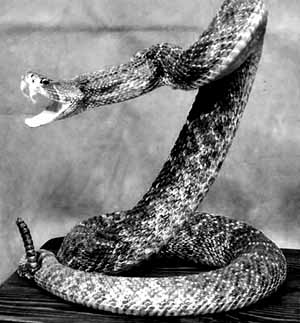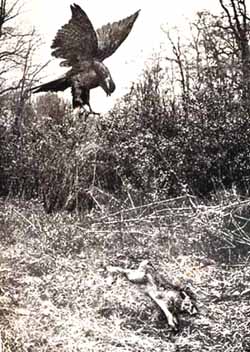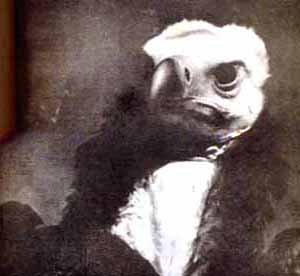 |
Environment
Everything in Nature Speaks of God
and His Moral Law
Plinio Corrêa de Oliveira
The principle that is expressed in this title is a well-known truth; it is, however, habitually applied with a unilateral purpose. The influence of sentimentality has lead us to ignore those aspects of nature that instruct man about the beauty of courage, audacity and all the attributes a man should possess for battle – a battle that becomes a sublime duty when he is confronted by evil.

The serpent symbolizes iniquity |
How much the animal kingdom can teach us about the different aspects of good and evil! It is not that animals are capable of having vices or virtues. Neither can they act upon good or bad principles in a way that transcends their simple animal nature.
The serpent, at right for example, is as much a creature of God as the lamb. Nonetheless, the first, by his guile, harmfulness to man, slithering crawl and seducing power, in a rich analogy, is an appropriate symbol of iniquity and evil. The serpent was even used as the means by which the Devil spoke to Eve!
In another analogy, the lamb – rich in purity, meekness and innocence – is a suitable symbol of Our Lord Jesus Christ and the Catholic. Animals, all equally good as works of God, instruct us about good and evil so that we can love one and hate the other. But in all cases, animals are merely animals.
May the reader pardon us for the banality of that last remark. Today, minds have become so greatly confused that if we talk about someone who is going to drink a glass of water, it is always better to say that the water is water, and not gunpowder or granite.

The falcon descends for the attack |
The falcon at left, which swoops down on a rabbit that flees in fear, makes us feel the strong and noble beauty of the fight. The falcon is an admirable symbol of the virtues of the warrior: calmness, strength, agility and precision. It moves through the air with such equilibrium and ease one might say that the law of gravity does not exist for him. Its velocity is proportional to that of the rabbit, making its strike forceful. Its powerful claws are already open, as is its beak.
Yet at the summit of the attack, it maintains an admirable loftiness symbolized by its wings, nobly opened in a flight that one could call ideally serene.
“But what about the poor little rabbit?” some sentimental reader will ask. “Is it right for the falcon to attack it?”
That sentimental, who is irritated by the falcon, will be just as irritated by our response. It is God’s will that animals eat one another. And that falcons eat rabbits… The animal kingdom, in which one devours another, is something different from anthropology.
God, who commanded that men live together amiably, also commanded that in this valley of tears animals should prey upon each other. He also permits man to eat animals. By this, He teaches us that men are incommensurately more than simple animals.

The scornful mouth... |
God is not egalitarian – another grand, very grand lesson.
What could better make us understand the horror of greed, pride and guile than the ‘physiognomy’ of the vulture at right? The low furtive ‘brow,’ the arrogant bearing of its head, the cold ‘inhuman’ gaze, the scornful mouth, the aggressive hooked beak, a terrible mobility that seems made for the attack – in short, everything about this vulture inspires horror.
Horror of what? Of moral evil, which separates us from God.
A liberal does not like to think about this because many men do not like to admit the existence of evil. Yet God instructs us about such evil with symbols like this vulture.
Thus, by considering nature, one learns to be neither sentimental nor liberal.

Translated from Catolicismo, June 1962
Posted July 9, 2010

Related Topics of Interest
 Vice and Virtue Symbolized in the Animal Kingdom Vice and Virtue Symbolized in the Animal Kingdom
 The Middle Ages, a Forest Filled with Symbols The Middle Ages, a Forest Filled with Symbols
 The Bee, a Symbol of the Church The Bee, a Symbol of the Church
 Are Ducks Animals or Divinities? Are Ducks Animals or Divinities?
 Objection: You Must Have Compassion for Ducks Objection: You Must Have Compassion for Ducks
 Heated Reaction on Animals Heated Reaction on Animals
 Don't Kiss Animals Don't Kiss Animals
 Humanizing Animals Humanizing Animals
 Questions on Ecology Questions on Ecology

Related Works of Interest
|
|
Environment | Cultural | Hot Topics | Home | Books | CDs | Search | Contact Us | Donate

© 2002- Tradition in Action, Inc. All Rights Reserved
|
 |

|